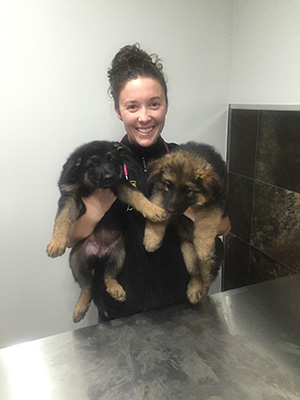Veterinarian
by Pam Chamberlain, submitted 2015
 Nicole Macdonald has known since she was in kindergarten that she would become a veterinarian.
Nicole Macdonald has known since she was in kindergarten that she would become a veterinarian.
Nicole studied biology and chemistry at Augustana. Not only did her professors help her achieve the marks she would need for veterinary college, but they also gave her opportunities for hands-on experience. For example, she helped Dr. Doris Audet with a research project involving the circadian rhythms of gerbils. Also, studying on a liberal-arts campus gave Nicole the opportunity to deepen her love of history in Dr. Rani Palo's classes.
In her third year, Nicole applied to the Western Veterinary College in Saskatoon. "Having a well-rounded education from Augustana gave me an edge," she says. "I had good writing skills, and with my history minor, I stood out from other applicants."
Nicole describes her four years of vet college as "very tough." However, while many of her classmates struggled with their courses, Nicole was one of the top five students in her biochemistry class-thanks, she says, to the foundation she received at Augustana.
In the summers, Nicole, who had grown up around cats and dogs, focussed on gaining more experience with large animals. One summer, she lived with a friend's parents in Oyen so she could volunteer in a rural vet clinic. Another year, she spent six weeks in rural Uganda working with goats through Vets Without Borders. She worked with horses at the large animal clinic on the U of S campus and did research and lab work on bulls
After graduating, Nicole began working at a mixed-animal practice in Ponoka. Along with two other vets, she cares for cats, dogs, horses, cattle-and occasionally sheep and goats. Which is her favourite animal to work with? "Oh, I couldn't choose," she says. "I love all animals. They don't judge, and they love you anyway." Although animals can't tell her what's wrong when they are ill, Nicole enjoys the challenge of figuring out the problem and making things better.
Physically, a vet's work can be demanding. Nicole is often on call during calving season and is called upon to do tough procedures like C-sections. However, the hardest part of the job is emotional. When an animal dies as a result of injuries, or when an owner decides it's time to euthanize a beloved pet, it takes a toll on Nicole. "It's draining," she says. "I'm never the same. They take a piece of me when they go."
But the rewards of the job outweigh the challenges. "It's the little victories that keep me going," Nicole says, "like saving a golden retriever that has been hit by a car or delivering a live calf during a C-section. That makes my day. Then I know I've done a good job."